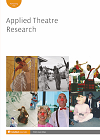- Home
- A-Z Publications
- Applied Theatre Research
- Previous Issues
- Volume 5, Issue 2, 2017
Applied Theatre Research - Volume 5, Issue 2, 2017
Volume 5, Issue 2, 2017
-
-
Theatre and participation: Towards a holistic notion of participation
More LessAbstractParticipation is central to and essentialized in theatre and interactive arts. While scholars have articulated the importance of participation in arts, participation has also been considered a foundational principle in development discourse, and it is largely external. Beyond the notion of participation as an external force, which I term a verb-oriented notion of participation, is the noun-oriented notion of participation, which is innate and organically induced from within an individual and a group or community (collective). In this article, I discuss a dual notion of participation and a relational interaction between these notions, which can lead to a holistic insight on participation. Using a case study that deals with managing conflict and bullying in a secondary drama classroom, an applied theatre project among refugees in Australia, I explore how this holistic insight into participation can influence how participation is framed and conceptualized in any applied theatre project. I argue that participation has been framed using a onesided, verb-oriented approach, and I propose a holistic notion of participation as a tool to rethink, reposition, reconceptualize and re-evaluate participation in applied theatre practice.
-
-
-
A political-ethical approach to disability in a Zimbabwean Theatre for Development context
More LessAbstractThis article examines the manifestations and practical dynamics and implications of a political-ethical approach in Theatre for Development (TfD) in Zimbabwe. Drawing from a TfD project that I facilitated with students with disabilities, I argue that nondisabled TfD facilitators need to engage in intensive encounters with participants in order to promote inclusive reflexivity and vulnerability. Such an approach may create multiple centres of power that can engender a radical approach to disability politics. The article acknowledges power-related risks and unintended outcomes of a political-ethical approach. I suggest that such negative implications may be minimized if facilitators adopt dynamic and multiple functions that can balance between ‘protecting’ participants and promoting radicalized dissent in disability research and artistic practice.
-
-
-
Rekindling the kampong spirit: Fostering a sense of belonging through community theatre in Singapore
More LessAbstractWhen Singapore embarked on its high-rise public housing scheme post World War II, citizens often bemoaned the loss of the ‘kampong spirit’, a colloquial term describing the sense of community felt while living in villages. More than 50 years on, the kampong spirit continues to inform Singapore’s nation-building plans. This article considers a community theatre project in Singapore aimed at reigniting the kampong spirit among residents from low-income neighbourhoods. The theatre project, which relied primarily on Boal’s (1974) Theatre of the Oppressed, sought to initiate conversations within the community in order to foster greater agency among residents. Examining the work through relevant frameworks on belonging revealed how the project enabled the community to build and maintain connections beyond the immediate space of the theatre performances, thereby deepening the emotional and affective dimensions of belonging. Belonging becomes a force of agency when cultural citizenship is activated, and the community participants become agents for change.
-
-
-
Out of Syria: A process drama in mathematics with change of roles and perspectives
More LessAuthors: Tor-Helge Allern and Ove Gunnar DragesetAbstractIn this article, we examine the possibility of changing communication patterns in teaching mathematics through the use of process drama, based on a research project themed on the refugee catastrophe in Syria. In the process drama, we applied change of perspective: the students had different roles, such as refugees, traffickers and the Italian coastguard, and they investigated some selected role types or categories in these situations (the authority, the curious one, the sceptic and the mediator). We found that change of roles and perspective may have different effects on the students, but that it can contribute to more student activity and in-depth learning. For teaching mathematics, we revealed the potential for more student activity through bigger attention to questions, explanations and argumentation, and found that the learning process was stimulated by change of perspective and the use of role categories.
-
-
-
Relief or reiteration? Performing and transforming pain
More LessAbstractThis article asks which approaches are the most effective when making ‘performances of pain’ – performances that not only represent pain, but also transform it. I bring together three performances of pain from around the world: Backyard Games, which is based on a rape in Israel; Thetha Ngikhulume, which tells stories from victims and perpetrators of apartheid in South Africa; and Fagaala, which represents the genocide in Rwanda. According to critics and even the artists themselves, each performance fails in its quest to transform pain. Rather than transforming pain, critical interpretations of these works show that they either reinforce or undermine painful events. Through examining performances that are considered to have failed, I wish to highlight the factors that make works successful in their transformation of pain. An analysis of the critical interpretations of these works shows that performances of pain are more likely to foster transformation when they foreground the experiences of victims and show these victims as creating an existence beyond pain. In order for performances to transform pain, this pain must not be overlooked, but rather allowed to evolve into hope and triumph.
-
Most Read This Month


